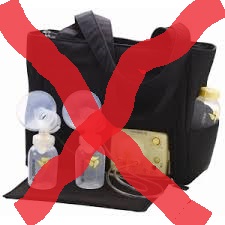When my son was born, one of the things that I was sure about was that I wanted to breastfeed. I wasn’t sure how long, and I wasn’t sure how the relationship would look, but I knew it was something that I wanted to at least try. Luckily for me, from the moment he was born Aaron was a champion nurser. He latched on with a huge mouth within 20 minutes of being born and basically stayed on my breast for about the next hour. He had so strong of a suck that I swear I felt the milk coming out of my toes when he would get going. Right side, left side, didn’t really matter. When I started my goal was 6 months. Well, 6 months gave way to 12 months, which gave way to 2 years, which gave way to “whenever the heck one of us decides we’re done.” I pumped at work for a year, then stashed my pump and continued to nurse on demand when we were together. In the end he weaned (with a slight push from me) at just over 2 and a half. We had a few bumps along the way (most notably finding out that he had a dairy allergy that required me to cut all forms of dairy out of my diet) but for the most part it was smooth sailing.
One of the things that I found essential to our breastfeeding journey was finding a “tribe of women” that could support me in my questions, concerns, and occasional freak-outs, especially in the early days and weeks. I started attending a monthly meeting of Breastfeeding USA and I found the support there amazing and essential. You see, before my son was born I had seen exactly 2 babies nurse in person, so I had no idea what typical nursing behavior was, and what things were normal and what things should cause me concern. The ladies at the meetings helped me with latch concerns, weight gain issues, fussiness, distractions, and biting (to name a few) and gave me suggestions and advice gathered from their own experiences that made my own experience that much easier. As my son aged I became the one able to offer advice and experiences, and help other women meet their breastfeeding goals. I found this incredibly rewarding and because of that, went through the process to become accredited as a Breastfeeding Counselor through Breastfeeding USA, which is an organization whose mission is to “provide evidence-based breastfeeding information and support, and to promote breastfeeding as the biological and cultural norm.” (For more information about Breastfeeding USA and to find a listing of counselors and active meetings in your area, click here.)
Breastfeeding is a hot-button issue at the moment, and you can find a million posts on the topic, everywhere on the spectrum from “There really isn’t any difference between formula and breast milk” to “Breast milk is the only acceptable food for a human baby.” People argue over where, when, how, and how long it should be acceptable for a child to nurse. Conversations can get very heated on the subject, and people tend to get very defensive about their own choices on the matter. This is a shame, because even with all the public discourse and social media discussions, there continues to be conflicting information given to women and their families, and a lack of true support for women who do choose that breastfeeding is the right choice for their families.
Even though our breastfeeding journey was on the easier side, there were still many things that I wish I could go back and tell my bleary-eyed, sleep -deprived, new mom self. Things like, “Watch the baby, not the clock,” and “Be kind to yourself, both you and baby are learning a new skill.” As a counselor, however, sometimes I kind of get this chance, because many of the things I struggled with in the beginning are the same kinds of questions that I get from other new moms. After polling several of the other counselors in the area, here are my top 10 “must knows” for breastfeeding pairs in the early weeks:
1. Breastfeeding is natural, but that doesn’t mean it is easy.
If this is your first baby, both of you are learning a brand new skill. Like any skill, it needs practice in order to be perfected. Simply put, babies (and mommies) learn to breastfeed by breastfeeding. The more you put baby to breast, the more opportunities he gets to practice this new skill. In the early weeks, you simply cannot nurse too often. It won’t be perfect at first, and that is okay. No matter how many times you shoot milk at the wall or shove a nipple in your baby’s eye, eventually both of you will get better and figure out the dance together.
2. Mom has a physical wound to heal.
In many cultures women are sheltered from the outside world for a period of time after giving birth. It varies from culture to culture, but in most cases, during this prescribed time a new mother is expected to stay indoors with baby, rest, eat, and heal. Female relatives and friends descend to care for her, as they will then expect to be cared for after their own deliveries. Unfortunately, in our culture women are often expected to be up entertaining visitors, cleaning, vacuuming, cooking, and carrying on with life immediately upon leaving the hospital.
This go-go expectation is not healthy for new mothers, or for new families. One of the best pieces of advice I got as a new mom is, “Don’t stand if you can sit, don’t sit if you can lie down, and don’t be awake if you can be asleep. This goes beyond the often heard “Sleep when the baby sleeps,” because it acknowledges that the new mother needs time and rest to recover from the very real challenge of labor and delivery (even more so if a c-section was necessary). The only way for mom to heal and have the energy to learn to care for her newborn baby is to be given permission to do nothing but eat, sleep, and nurse and hold the new baby. Everything else – cooking, cleaning, visitors, social obligations – they can wait, and should wait, until the new mother feels healed and ready.
3. The first weeks need to be about mom and baby.
This goes somewhat along with #2. The beginning of any breastfeeding relationship can have many bumps. Mom needs time to hold and snuggle her new baby and to learn to read her cues. She cannot do this if she is constantly up entertaining family members, cleaning house, grocery shopping, and passing her baby off for others to cuddle.
4. But dad is also an essential part of the equation.
One of the most important parts of my successful breastfeeding relationship was a solidly supportive partner. Dads sometimes struggle to find their “place” in the breastfeeding process. Although they are not actively feeding the baby, there are so many ways that dad can be involved. He can remind the new mother to eat and drink, and bring her the supplies she needs as she learns to breastfeed. He can be her cheerleader, reminding her to be kind to herself as she learns this new skill. He can take the baby for periods of time and allow mom to have a rest, or a nap, or a walk outside. He can fend off relatives that pressure her to pump so they can give the baby a bottle. And he can encourage her when she begins to doubt herself and her ability to provide enough for her baby.
5. Forget the pump.
Pumping sucks, literally. Breast pumps are necessary for moms who are returning to work; however, in the early weeks using a breast pump on a regular basis can actually cause more harm and stress than anything else. Unless there is a medical reason for a new mom to pump (i.e. baby is in the NICU or has some other health condition that makes pumping necessary), the best thing a new mom can do is nurse her baby on demand. This frequent nursing will help establish a healthy milk supply equal to baby’s needs. For most women, pumping before baby is about 6 weeks old does nothing but cause additional stress (due to the time required to pump, wash bottles, wash pump parts, ect) and can also lead to problems down the road with oversupply, which can be difficult to manage.
6. You need to eat, and drink, and maybe A LOT.
You need extra calories to make milk. How much varies from woman to woman. Stock up on healthy snacks that you can prepare and eat quickly and with one hand.
7. Trust your instincts, trust your body.
The vast majority of women are able to produce more than enough milk to feed their new baby. We get into trouble when we ignore our instincts and listen to experts who tell us that the baby should eat only ever 2, 3, 4, hours, or should always gain x number of ounces per day, or that snuggling your newborn will somehow “spoil” her. Trust your mommy gut–it will rarely steer you wrong.
8. Baby doesn’t read the parenting books.
She doesn’t know that she is “supposed” to nurse every 3 hours for 10 minutes on each side and is “supposed” to sleep at least 4 hours by 2 months of age. Some babies do this. Others nurse every hour round the clock. If she is happy and growing, both patterns are within the realm of normal.
9. Get help early, get help often.
Whether this is your first baby or your fifth, getting help at the first sign of trouble can be essential in a breastfeeding relationship. Lactation consultants, breastfeeding counselors, doulas, and other experienced women are valuable sources of information and help. Also, just because you have talked to one LC, counselor, or breastfeeding professional, don’t feel that you cannot ask for help somewhere else if your problem is not resolved. Talking to and meeting with more than one professional can be helpful, as different people have different approaches, information, and experiences.
10. Find your tribe.
Women were not meant to learn to breastfeed (or parent for that matter) alone. Find your tribe of women who can support you and hold your hand through the hard times. We are fortunate in this area to have a number of active groups where women can find information, advice, and support, both in person and online. Some are headed by lactation consultants, others by counselors or other breastfeeding professionals. All are open to women and their partners at any time, before baby is born or after. Find the one that fits your personal style and needs.
Whether or not to breastfeed is just the first of many parenting decisions a new family must make. Having accurate expectations and information can help a new mother to make the best choice for her individual family, and not get sucked into the many “booby traps,” which can derail an otherwise healthy breastfeeding relationship. Whether your breastfeeding relationship lasts a day, a week, a month, a year, or beyond is up to you.
Nurse on mamas, nurse on.
AREA SUPPORT GROUP MEETINGS:
IOWA CITY
Beloved Bonds Breastfeeding Mommas Group
Kimberly Hendricks 319-631-5882
Mother and Child Midwifery Clinic
Eastwind Healing Arts Center
221 East College St, Iowa City
www.belovedbonds.com
1st and 3rd Tuesday 12-1 PM
2nd and 4th Tuesday 7-8 PM
Breastfeeding and More
Mercy Hospital, Iowa City
McAuley Room
Thursdays 12-2 PM
University of Iowa Breastfeeding Group
UIHC Iowa River Landing
Wednesdays 5-7 PM
CEDAR RAPIDS
Breastfeeding USA
Meetings held at Birth, Baby & Beyond
4330 Czech Ln NE, Cedar Rapids
2nd and 4th Thursday of each month at 7:00PM
4th Monday of each month at 10:00AM
Accredited BFUSA Counselors also available for individual meetings at other times.
Breastfeeding Friends
St Luke’s Hospital, Cedar Rapids
Tuesdays 4:15-5:15 PM
Mercy Breastfeeding Group
Mercy Hospital, Cedar Rapids
Birthplace Classroom
Wednesdays 10:30-12:00
2nd Thursday of each month 5:30-7:00 PM














